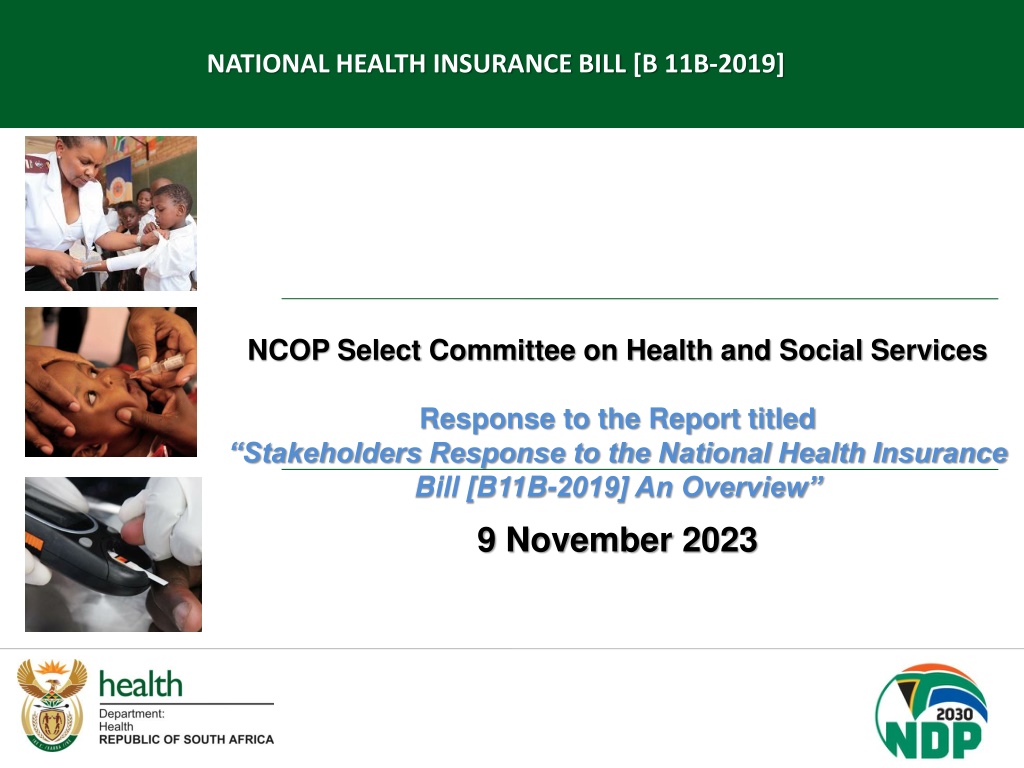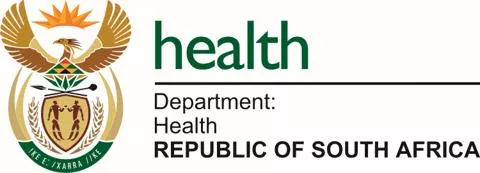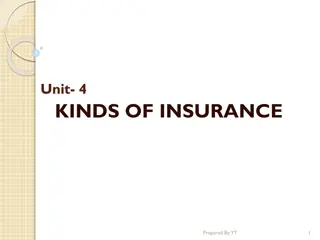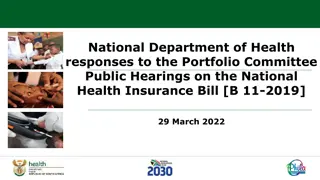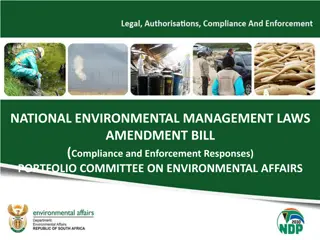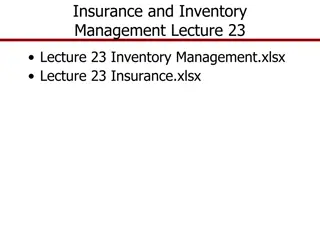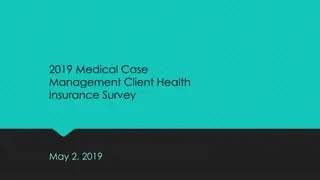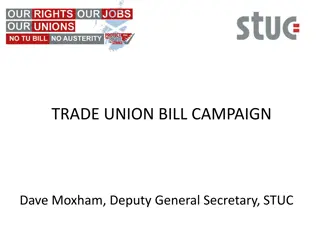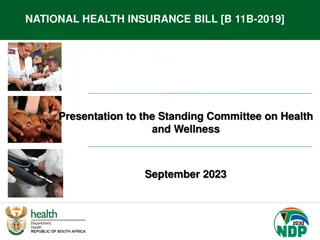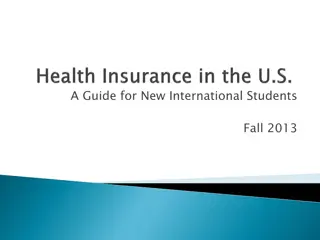Stakeholders' Responses to National Health Insurance Bill [B.11B-2019]: Overview
The National Council of Provinces (NCOP) Select Committee on Health and Social Services received numerous submissions from stakeholders regarding the National Health Insurance Bill [B.11B-2019]. The report highlights both support and opposition towards the Bill, discussing key issues such as addressing medical scheme challenges, improving healthcare accessibility, and concerns around funding, state-owned enterprises, human rights implications, and provincial powers. The Department aims to address these points in their responses to the NCOP Committee.
Download Presentation

Please find below an Image/Link to download the presentation.
The content on the website is provided AS IS for your information and personal use only. It may not be sold, licensed, or shared on other websites without obtaining consent from the author. Download presentation by click this link. If you encounter any issues during the download, it is possible that the publisher has removed the file from their server.
E N D
Presentation Transcript
NATIONAL HEALTH INSURANCE BILL [B 11B-2019] NCOP Select Committee on Health and Social Services Response to the Report titled Stakeholders Response to the National Health Insurance Bill [B11B-2019] An Overview 9 November 2023
PURPOSE To provide responses to the NCOP Select Committee based on the recommendations contained in the report titled Stakeholders Response to the National Health Insurance Bill [B11B-2019]: An Overview as received
INTRODUCTION The Department: Notes that the NCOP received a total of 106 written submissions (35 from individuals and 71 from stakeholder groups or organisations) Notes that an additional 23,465 (of which 9,764 were electronic copies and 13,701 hand- delivered) submissions were received from all provinces These submissions are from a diverse set of stakeholders including: i. Individuals ii. Corporate entities/businesses iii. Medical schemes and their representative bodies iv. Business associations e.g., BUSA v. Regulatory bodies i.e., HPCSA vi. Healthcare Professional Associations vii. Labour Unions viii. Pharmaceutical representative bodies ix. Civil society formations/bodies i.e., ratepayers associations; patient advocacy groups This presentation will focus on the responding to the core issues noted in the report
CORE ISSUES NOTED IN SUPPORT OF THE BILL The Department notes and affirms the points of support for the Bill as indicated in the report: 1. The implementation of NHI will address medical scheme challenges 2. NHI will lead to a situation where there will be no medical stockouts at facilities 3. NHI will lead to improvements in the accessibility of healthcare services to the population 4. There will be better working conditions for health care workers 5. Health infrastructure will be refurbished 6. NHI will lead to the creation of an integrated funding pool in the health system thus ensuring the realization of the benefits of strategic purchasing functions 7. NHI will be accompanied by better monitoring systems 8. NHI will lead to reduced cost of care 9. NHI will contribute to the improved state of health in the country
CORE ISSUES NOTED IN OPPOSITION TO THE BILL The Department notes the points of opposition to the Bill as indicated in the report: 1. The Bill is silent on funding 2. NHI will lead to the creation of another inefficient State-Owned Enterprise 3. NHI is a violation of the Bill of Rights 4. NHI will create an environment that will lead to medical professionals emigrating 5. The current state of public health care needs to be improved first 6. NHI will infringe on provincial powers and responsibilities In the next set of slides, the Department provides responses to each of the issues noted in the table on pages 13 to 20 of the report
Departments proposed amendments to the Bill The Department is considering key areas where there is strong motivation for amendments to the Bill: 1. Governance Several suggestions were made for strengthening clauses related to the Board and advisory committees This includes further proposals for separation of powers between the Minister and Board 2. Medical Schemes Several stakeholders submitted proposals for dealing with Section 33 of the Bill The Department is looking at possible rewording of the clause to make the intentions clearer The use of the phrase fully implemented is creating debate and concern This is a basic tenet of the NHI 3. District Health Management Offices (DHMOs) Several parties made useful inputs regarding the functions and responsibilities of the DHMOs 4. Technical correction It was highlighted that the wording regarding medical scheme tax credits is incorrect
CONCLUDING REMARKS The comments and inputs made by all stakeholders are appreciated The Bill is not an implementation plan concerns raised by some stakeholders that it lacks details in certain areas the details can only be provided through Regulations and in some instances through operational and procedural plans of the Fund Including every single detail in the Bill will make it more of a guideline than a founding Act The Department intends to consult the public even when regulations are drafted Not every input received must be incorporated into the Bill or the regulations The primary consideration for the review and inclusion of any inputs is whether they enhance the achievement of UHC or they are intended to entrench and retain the status quo The Department will listen to the mandating debate on 14 November 2023 to obtain final insights into the issues raised concerning the Bill The Department will then consult the its legal team on proposed wording for suggested amendments for the Select Committee s consideration
PREAMBLE PROPOSED AMENDMENTS NDOH RESPONSE The comment to include the word equity more broadly is a nuanced one because the Bill is premised on realising the rights enshrined in the Bill of Rights, which inherently are based on the principle of social solidarity (which encapsulates equity/fairness) While Clause 1.2 of the Bill says that The aim of universal health coverage is to provide South Africans with (a) access to needed health care that is of sufficient quality to be effective; and (b) financial protection from the costs of health care , this formulation does not mention equity, a fundamental principle of universal health coverage. Equity is only stated three times in the Bill. Yet Section 2 states: providing for equity and efficiency in funding , once as a Function of the Fund (10.1 e) to prioritise the timely reimbursement of health care services to achieve equity and once in the memorandum (at Section2.4) as the purpose of the introduction of the reforms. But the Bill gives no indication of how it will overcome the long- standing structural, political, and economic factors driving inequity. The overall provisions of the Bill indicate the institutional and organisational reforms that are planned as part of transforming the SA health system to address inequities based on fragmentation and to ensure that what is allocated in the health sector is used to achieve the best possible health outcomes for a socially and economically productive population Implications of the Bill on COIDA should be considered This matter is considered in the Schedule of Acts that require amending/repeal for COIDA, it is specifically in Section 1 (deletion of the term medical aid); Section 2 (1)(a) and Section 3(a) and (b) respectively
DEFINITIONS PROPOSED AMENDMENTS NDOH RESPONSE The definition for Fully implemented National HealthInsurance must be inserted in Section 1 of the Bill to provide legal certainty on what fully implemented means as used in Section 33. The Department does not support the inclusion of a definition on fully implemented NHI as this can only be determined progressively as implementation progresses, and it is best outlined through a gazette process rather than through a founding Act The Bill contains a clear definition of what is meant by primary health care - this definition in part (a) outlines the first level of contact of individuals/family/and community with the health system. Therefore, the first point of care would be a clinic (public) or a GP (private). A clear definition for primary health care point should be inserted. There is a reference to primary allied health professionals in the definition which only applies to professionals registered with the Allied Health Professions Council. The definition for strategic purchasing must be inserted with a description of how that will be implemented or undertaken by the Fund. The definition of strategic purchasing is already included in the Bill the request to include how it will be implemented does not form part of the definition, but rather elements that can be elucidated via regulations over time Practices that are not part of the NHI must be clearly defined. This point does not require a definition the Bill in various sections is very clear that the Fund will only purchase health care services from accredited and contracted providers. There is no provider/practice that is intended to be part of NHI as the Fund will only be responsible for purchasing services, not their provision
DEFINITIONS PROPOSED AMENDMENTS The Bill should clearly define complementary health services (and professions) and include homeopathy. NDOH RESPONSE The Department does not support the proposal to refine the definition of complementary cover to mention specific professions this is something that can be done progressively as implementation unfolds These elements will all be defined and outlined through enabling regulations as provided for in Clause 55 of the Bill they cannot be outlined in a founding Act (This is covered in the National Health Act, 2003) The Bill does not currently include a definition of employee the Department does not deem it necessary to provide a specific definition because NHI is not specifically targeted at employees. Should it be deemed necessary, the more appropriate definition to use would be that included in the LRA under Section 213 The criteria, prescribed fees, administrative infrastructure required to issue and deal with the Certificate of Need should be defined and/or established. The definition for employee should be amended to be in line with the requirements of International Laws which South Africa has ratified.
DEFINITIONS PROPOSED AMENDMENTS NDOH RESPONSE The definition of structuring units should be defined. The Bill should provide guidance on the way the referral system would need to be attend to. It is unclear what is meant by structuring units; Regarding the referral pathways, this would be published and gazetted as part of the operational procedures and protocols of the Fund The definitions for health goods , health products , health related products , health care services , medicine , scheduled substance , medical devices and equipment should be refined. It is unclear what refined implies in this context the Department is of the view that the definitions provided are sufficient and where necessary they are consistent/drawn from already existing Acts (this was considered by the Portfolio Committee and some changes made) Amend to: basic health care services means services provided by health care service providers which are essential for maintaining good health and preventing serious health problems including preventative services, primary health care, emergency medical services, diagnostic services, treatment services, rehabilitation, and palliative care services. The Department does not support the proposed revision the term rehabilitation implies an inherently integrated care approach that supports patient enablement, self-management and self-care as a holistic approach to effective patient management.
PURPOSE & APPLICATION OF ACT PROPOSED AMENDMENTS NDOH RESPONSE Purpose: The Bill makes provision for the users funding health care services that will not be covered by the NHI Fund (through out- of-pocket or by medical schemes). This implies that the NHI Fund will not be the single purchaser and financier, which is contradictory to the purpose of the Bill. The Department does not agree with this disposition the purpose of the Bill is to create the necessary institutional and organizational elements to enable for the creation of the NHI Fund as a single, strategic purchaser of personal healthcare services for the population. These services will be defined any service that falls outside of that scope can be purchased through other mechanisms, such as medical schemes Application of the Act: Subsection 3(5) of the Bill must be removed. The purpose of the Competition Act is to protect the public against uncompetitive behaviour. The Department does not agree with the recommendation. It is important that the Fund is exempt from the Competition Act, as it will be responsible for meeting population health needs through purchasing healthcare services (using negotiated tariffs/prices) as a public good Section 3(2) excludes military health services and members of the National Defense Force and State Security Agency but does to clarify where their family members will be covered by the NHI Fund or not. Section 3(4) excludes the Fund from the ambit of the Competition Act 89 of 1998, but it does not set out what steps will be taken to prevent inflationary pricing and payments occurring. Members of the SAMHS and their dependents will continue to access and utilize services per the provisions of the mandate of the SAMHS (already part of other laws that are not being amended) The Department is very clear that the exemption from the Competition Act will only apply to the Fund, and not is service providers. Mechanisms will also be implemented to change provider payment systems and applicable tariffs to control cost, support affordability and sustainability objectives
ACCESS TO HEALTH CARE SERVICES PROPOSED AMENDMENTS NDOH RESPONSE The conditional grant budget line item for mental health needs to be revisited (page 58; 8.7). This amount is not congruent with the proposed recommendations from a Mental Health Investment Case Report done in 2021 to sufficiently strengthen mental health services and integration. An adequate conditional grant for mental health is necessary to correct the injustices of the past regarding mental health service allocation and investing in scaling up mental health care in the country. The Department notes this point raised here However, it does not imply the Bill must be adjusted. Instead, the matter is raised is for consideration in operational and transitional plans as part of the phased implementation process envisaged
POPULATION COVERAGE PROPOSED AMENDMENTS The limitation of access to care by limiting access for asylum seekers (and children of asylum seekers seeking emergency hospital treatment) and undocumented migrants (or illegal foreigners), and by insisting on registration before using the service, is not aligned with Section 27 of the Constitution, and must be amended by removing the limitation of care to asylum seekers or undocumented migrants (or illegal foreigners). Amend to: (3) All children, including children of asylum seekers or illegal foreigners and all pregnant women are entitled to basic health care services as provided for in section 28(1)(c) of the Constitution. Subsection 5 must be removed from the NHI Bill since it could be better regulated by making health insurance cover a Visa requirement. NDOH RESPONSE The Department does not support this assertion the requirement to register as users is planned as a simple process where users register when they come into contact with the system no user will be denied access to care for not being registered; instead, all accredited and contracted providers will be expected to actively register users as the system unfolds The limitation to care envisaged for asylum seekers and undocumented migrants is based on legally sound principles and is also consistent with relevant local laws and international conventions that the country has ratified The Department does not support this proposal subsection 5 is important as it gives clarity on expectations for foreign visitors when visiting the Republic these are similar to obligations placed by other countries on SA citizens when they travel abroad
REGISTRATION AS USERS PROPOSED AMENDMENTS NDOH RESPONSE *Implications for asylum seekers The amendment must reflect that registration can happen at the point of service. The Department affirms that this is currently what is indicated in the Bill users will register at a point of service Section 5 stipulates that a person must present proof of such registration to the health care service provider or health establishment to secure the health care service benefits to which he or she is entitled. This assumes that (a) that all primary health care sites, where a person would register, have access to a computer with adequate reception and internet connectivity, and (b) that there is adequate capacity to handle all registrations. The Department is already in the process of implementing the Health Patient Registration System this system is being used in a number of public health facilities. Where there are challenges the Department is proactively addressing the issues concerning equipment and enabling infrastructure such as connectivity. Our position is that such details cannot be included in the Bill but must form part of the operational and roll-out plans informing the phased implementation plan
REGISTRATION AS USERS PROPOSED AMENDMENTS NDOH RESPONSE The purpose and implications of Subsection 5(3) should be clarified. For example, should the divorced parent of a child seek the other parent s consent for registration? Every child will be entitled to registration per defined prescripts where relevant the primary guardian or parent can register the child at their nearest facility of choice Consideration needs to be given to the registration of people with disabilities where typical biometric registration may not be possible e.g., in cases of severe spasticity in the hand or arm, amputations & paralysis. The registration process will not only be reliant on biometric data the Bill outlines that other such information as may be prescribed including several elements mechanisms will be developed and deployed to meet the needs of targeted vulnerable people as described here
RIGHTS OF USERS PROPOSED AMENDMENTS Constitutionality of the Bill in respect of freedom of choice NDOH RESPONSE NHI builds on the provisions of the Constitution, especially from the Bill of Rights (Section 27). Furthermore, NHI is intended to support the realisation of every citizen s right to healthcare Individual rights cannot override those of the greater good Every person is at liberty to choose their primary care provider The Bill should address how compliance with this provision will be monitored, and what the consequences for non- compliance will be. The Department believes that the various set of planned Regulations in Clause 55 of the Bill address this request adequately. Given the operational nature compliance and consequence management processes, it is more appropriate for these to be outlined in regulations this is because such requirements will change regularly based on developments in the health sector and service provision demands over time.
HEALTH CARE SERVICES COVERAGE PROPOSED AMENDMENTS NDOH RESPONSE The limitation of access to care in Section 7(1)(d) is not aligned with Section 27 of the Constitution and must be amended by removing the requirement to adhere to referral pathways. The Department disagrees with this recommendation the requirement to adhere to a referral pathway is important in ensuring rational and effective use of available health care services; it also ensures that users are accessing the health system at the most cost effective and appropriate level of care Adherence to a referral pathway does not imply that users cannot access higher levels of care nor that they may be denied care in an emergency to the contrary; users that require access to higher levels of care will be supported to access that care and for those with emergencies they can still access the care they need Referral pathways are important for ensuring that there is more integrated service provision across all levels of care, and that ALL users can receive the best possible care given the health resources available.
COST COVERAGE PROPOSED AMENDMENTS NDOH RESPONSE The link and/or distinction between the NHI Fund, medical schemes and private health insurance should be explicitly addressed. The Department believes that Clause 33 clearly outlines this but will relook at wording 1. The NHI Fund will purchase personal health care services on behalf of the entire population from appropriately accredited and contracted providers 2. The package of care will be comprehensive incorporating the full continuum of care 3. Over time, medical schemes will evolve into a complementary environment where they will offer only that which the Fund does not cover Section 8(2)(b) should indicate what kinds of services would be covered or excluded. More importantly, the Bill should indicate whether the provision of contraceptives would be excluded by this provision from the Fund. The Bill cannot outline the full list of healthcare services that will be covered or excluded by the Fund such details are best outlined in enabling regulations to allow for flexibility around planning, service provision configuration and roll out There is no intention to exclude the provision of contraceptives from what is to be covered under the Fund. Instead, the intention is to ensure that maternal and child health services are adequately covered, including family planning services
NHI FUND PROPOSED AMENDMENTS NDOH RESPONSE Clause 48 deals with sources of income and lists various sources from which the Fund may derive income. However, there is no mention of prepayment of contributions by any party. Given the fact that the Fund is a national public entity, mandatory prepayments must vest in the National Revenue Fund. The Department does not support the proposal that the Bill must indicate elements around prepayment of contributions the Fund is envisaged as a non- contributory, tax funded system with allocations being sourced from the National Revenue Fund (prepaid) Section 10(1)(e): The Bill should set out how the Fund will be capacitated to prioritise the timely reimbursement of health care services to achieve equity. The Department believes that such detail does not belong in the Bill these are implementation process issues that can be provided for in transitional operational plans, not in a founding Act The Transitional Provisions outlined in Section 57 of the Bill provide the framework mandate for this process
POWERS OF THE FUND & HEALTHCARE BENEFITS PRICING COMMITTEE PROPOSED AMENDMENTS NDOH RESPONSE Section 11(2)(e) and Section 26(3) must be amended to reflect that value-based sustainable prices must be negotiated for services. The Bill already outlines Alternative Reimbursement Mechanisms that will be utilized to drive value and ensure sustainability of the health system going forward these include DRGs, capitation and global budgets The Bill should be amended to reflect the functions of the Pricing Committee. The Fund will be the only purchaser of health services, and the only financier of health services. However, it is unclear what the funding for health allocated via the equitable share will be used for, and how other types of health care will be covered. The amendment must reflect how pricing and tariffs will be addressed in the NHI and whether differential cost bases of rendering services in the public and private sectors will be considered in the setting of tariffs. The Pricing Committee functions are outlined in s26(3) The equitable share funding allocations directed at personal healthcare services provision will be redirected and consolidated into a single fund under the NHI Fund these are the resources that the Fund will then utilize to actively purchase health care services from accredited and contracted providers (s32) The NHI Fund will put into place mechanisms to support the determination of fair, transparent and equitable prices for all providers the intention is not to implement differential tariff regimes that would simply entrench inequities and compound the unfair distribution of key health sector resources
BOARD OF THE NHI FUND PROPOSED AMENDMENTS NDOH RESPONSE District Health Management & Appointments for entities: The amendment of the National Health (Act 61 of 2003) must receive attention. The Department is unclear as to what requires further attention on this provision, suffice to say that DHMOs are intended as substructures responsible for the active service planning to ensure that population health needs are met at the lowest level of the health system The appointment process and expertise requirements of members constituting the Health Products Procurement Unit (HPPU) should clearly set out. The HPPU is not a governance structure of the Fund it is a unit within the Fund that will be tasked with elements on setting the procurement frameworks, in compliance with existing laws i.e., PFMA it will be staffed by technically competent people as determined by the Board which is responsible for determining the employment conditions The Bill should be amended to give the Board complete authority over and responsibility for the NHI Fund. The Minister of Health cannot relinquish responsibility for oversight and governance of such an important entity provisions in the Bill ensure that Minister has adequate oversight over the Fund while at the same time ensuring that the Board is allowed to exercise its powers and responsibilities without undue influence (s92 of the Constitution)
ADMINISTRATION COSTS OF THE NHI PROPOSED AMENDMENTS NDOH RESPONSE The administrative cost of the NHI should be inserted or reflected. The Department does not agree with this amendment there is currently no provision in the Bill that indicates an administrative cost estimate/amount. This is an operational matter, but the Department recognizes the need to ensure that the administrative costs of the Fund must be kept to the minimum and majority of the allocated budget must be used to meet the health needs of the population
CHIEF EXECUTIVE OFFICER PROPOSED AMENDMENTS NDOH RESPONSE The level of skills and experience to be held by the CEO should be inserted or reflected. It is advisable that the level of skills and experience of a CEO is not legislated as the requirements may change from time to time What is important is that the CEO should be a competent administrator capable of performing the functions and responsibilities outlined in Clause 20(2) and subject to the advice of the Board [s19(1) must be appointed on the basis of his or her experience and technical competence as the administrative head of the Fund in accordance with a transparent and competitive process.] The Board of the Fund will therefore determine these skills and experiences required for the CEO of the Fund
OFFICE OF HEALTH STANDARDS COMPLIANCE (OHSC) PROPOSED AMENDMENTS NDOH RESPONSE The challenges faced by the Office of Health Standards Compliance (OHSC), licensing processes, and the implications thereof on the implementation of the NHI are not reflected in the Bill. The functioning of the OHSC is provided for in the National Health Amendment Act (NHAA) of 2013 and the Regulations thereof. Consequently, any perceived functional challenges of the OHSC cannot be legislated through the NHI Bill as there is no intention to amend the 2013 NHAA Any perceived challenges such as licensing processes are operational challenges that must be addressed by strengthening the operational capacities of the OHSC and do not require inclusion in the NHI Bill
ADVISORY COMMITTEES ESTABLISHED BY MINISTER PROPOSED AMENDMENTS NDOH RESPONSE The mandate of the Benefits Advisory Committee (BAC) in relation to clause 1 and clause 25(5) should be defined The mandate of the Benefits Advisory Committee (BAC) is adequately provided for and has been defined in Clause 25 (5). It is not appropriate in terms of legislative drafting to provide for the mandate of a Committee in definitions The amendment should reflect the link between the Health Care Benefits Pricing Committee and the Benefits Advisory Committee. The link between the BAC and the Health Care Benefits Pricing Committee (HCBPC) is that both are Committees that advise the Minister on the type of health care benefits that will be covered under NHI through the BAC and the price at which services will be purchased by the Fund through the HCBPC) There is no necessity to amend Clause 26 and Clause 27 of the Bill The term health care practitioners should be defined. A health practitioner is defined in other legislations such as the Health Professions Act, Nursing Act, etc. It is defined as any person, including a student, registered with the Council in a profession registrable in terms of this Act; The composition of the Board, Benefits Advisory, Health Care Benefits Pricing Committees and Stakeholder Advisory Committees should include child health experts. Members of the Board and the Ministerial Advisory Committees (MACs) will consist of persons with a diversity of skills and expertise relevant to the mandated functions of those committees. Where expertise is required such as in child health, these skills/expertise will be contained in the functional or technical subcommittees of the MACs
ROLE OF THE DEPARTMENT PROPOSED AMENDMENTS NDOH RESPONSE The NHI Bill significantly reduces the functions of the provincial departments of health by amending Section 25 of the National Health Act, and thus giving the national department a larger role. The implications thereof are not reflected. The introduction of strategic purchasing of personal healthcare services as expressed in Clause 32(1) and 32 (2) of the Bill is key to the shifting of the public health sector funds into the NHI Fund as the functions are re-aligned. This will occur as the purchaser/provider split is implemented and the provinces are delegated only the provider functions. The purchaser provider split that will arise from the creation of the Fund is important for creating an environment where accredited and contracted providers and suppliers of services offer cost- effective, efficient prices and deliver quality healthcare services to the population. To establish a strategic purchaser, the role of provinces must be amended as provided for in the amendments to Section 25 of the National Health Act
ROLE OF MEDICAL SCHEMES PROPOSED AMENDMENTS Section 33 of the Bill must be amended to allow for the continued operation of medical schemes so that the burden of achieving universal health coverage can be shared by both the public and private sectors and that adequate funding for universal health coverage is available. NDOH RESPONSE A key aim of implementing NHI is ensuring that progressively the country eliminates the fragmentation in the mobilising and allocation of healthcare financing resources in the country. Consequently, Clause 33 is essential to achieving equity in access to the entire financial and non-financial (especially human resources for health) resources of the national health system. Clause 33 is inevitably a central tenet of the health sector reforms because the Constitution regards everyone equally before the law and enjoins the State to undertake rational and reasonable steps towards progressively ensuring that everyone, not only those with control of resources, have access to needed healthcare services. Clause 33 provides that these services which will be excluded from payment from the Fund may be provided to individuals through voluntary complementary cover. They will change over time as technology and the economy changes.
PURCHASING OF HEALTH CARE SERVICES PROPOSED AMENDMENTS NDOH RESPONSE Clause 35: The amendment should include a provision for, or mechanism whereby private health providers are paid directly. Clause 35 (2) and 32(3) and 32(4) on Purchasing of Health Care Services provides for accredited and contracted public and private providers at primary health care level (PHC) and hospital level to be reimbursed directly by the Fund There is no need to amend this Clause
EMERGENCY MEDICAL SERVICES (EMS) PROPOSED AMENDMENTS Further consideration should be given to the provision of and payment for EMS (under NHI). NDOH RESPONSE Under Clause 35 (4) (b), mobile emergency medical services in the private sector will be reimbursed on a capped-based fee based on severity Clause 31 (A)(k) of amendments to the National Health Act (NHA) provides for the District Health Management Office to facilitate the integration of public and private health care services such as emergency medical services but excluding public ambulance services Section 35(4)(b) of the NHI Bill and Section 31A of the National Health Act should be clarified. Public Ambulance Services are provided for in Schedule 5 of the Constitution as a direct (non-concurrent) competence of the Province There is no contradiction between Clause 35 (4)(b) of the NHI Bill and Clause 31 (A)(k) of the amendments to the NHA
ROLE OF DHMOs PROPOSED AMENDMENTS NDOH RESPONSE *Relates to role of provincial departments and the amendment of the National Health (Act 61 of 2003): It is unclear how non- personal healthcare programmes relate to the functions or duties of the Fund and how they will be funded. The President must appoint the head of each of the entities, including the DHMO. Non-personal health care services will continue to be funded through equitable share of the budget that will not be channeled through the NHI Fund but through the Department of Health either at national, provincial, district and even through municipalities. The Powers and Functions of the President are contained in Chapter 5, Section 84 (2) of the Constitution and do not entail appointment of Heads of Entities. Such a function is provided for through sectoral legislations such as the National Health Act, under the jurisdiction of the relevant Minister, which in this case would be the Minister of Health The DHMOs will perform a function at the district level and the approach is therefore not aligned with the constitutionally determined three levels of government. The District Health Management Office (DHMO) is established in terms of amendments to the National Health Act Section 31 (A) and it is a functional Unit of the Department of Health. It is not a sphere of Cooperative Government as provided for in Section 40 of the Constitution Sections 36 and 37: More clarity on the relationship between district health services (DHMOs and CUPs) and provincial governments, as well as Central Hospitals is required. DHMOs are a functional of the Department to be established as a national government component Contracting Units for PHC (CUPs) are a functional unit of the NHI Fund located at a subdistrict level Central Hospitals will be established as national government components reporting to the national sphere
CONTRACTING UNIT FOR PRIMARY HEALTH CARE (CUPs) PROPOSED AMENDMENTS NDOH RESPONSE Section 37: The CUP as described in the Bill does not have contractual capacity to enter into any agreements with the Fund. The clause should be amended. In line with the principle of purchaser-provider split, the Contracting Units for PHC are Units that the Fund will use to coordinate contracting with providers at a subdistrict level CUPs are a representation of the NHI Fund at a subdistrict level CUPs will not enter into any contractual agreement with the Fund as they are Units of the NHI Fund There is no necessity to amend the Clause
HEALTH PRODUCTS PROCUREMENT UNIT (HPPU) PROPOSED AMENDMENTS Section 38: The Bill should specify or clarify how unregistered health care facilities (and providers) will be regulated. NDOH RESPONSE In line with Legislation, health care establishments must be registered in accordance with the Chapter 6 of the National Health Act and the various Statutory Councils that regulate health care providers. In addition , the 2013 National Health Amendment Act makes provision for all health establishments to be further regulated for norms and standards for quality It is not necessary to duplicate provisions of other legislations in the NHI Bill Clause 38 should be read with clauses 38(6) and 38(7) and amended accordingly. Clause 36 (6) makes provision for accredited providers procuring according to the Formulary, and suppliers listed in the Formulary must deliver directly to the accredited and contracted health service providers and health establishments. Clause 38 (7) provides for Section 217 of the Constitution, the Preferential Procurement Policy Framework Act and the Broad-Based Black Economic Empowerment to be complied with when providers are procuring health products The two provisions are complementary and not in conflict. Therefore, there is no need to effect any amendments
PAYMENT OF HEALTH CARE SERVICE PROVIDERS PROPOSED AMENDMENTS NDOH RESPONSE Clause 41(4) only refers to global fees for in- hospital treatment. There should be a provision for out of hospital treatment, or treatment in rehabilitation facilities. The Bill references several reimbursement mechanisms, not just global fees for in-hospital care. In addition to these, there is capitation for PHC services, global budgets for outpatient services and even capped-fees for defined specialist services. The plan is to have a holistic regime of reimbursement tools that enable effective patient treatment and management, as well as ensuring affordability and sustainability of the system. Where entities take responsibility for performance (clause 41(3)(b)), they should be able to decide on the tools of the trade to be used. This could also be construed as an interference with the property rights of health establishments. Further, there is a procuring entity under current procurement legislation and will remain so under the Procurement Bill. The HPPU would not be able to prescribe to the NHLS what it can or should procure. This would apply to private laboratories, the payment of which would be all-inclusive (clause 41(3)(b)). The NHI Bill does not contain any clauses that dictate tools of trade . Instead, the Bill is very clear that for any service provider to work with the Fund, they will have to meet pre-determined criteria around performance this includes ensuring that they meet all set accreditation and contracting requirements This is similar to many practices in the health sector currently. Health care providers and affiliated service providers are expected to meet certain criteria, mainly through contractual arrangements these arrangements are directed at ensuring the best value and outcomes are achieved for patients/users (currently the case with NDOH)
ACCREDITATION OF SERVICE PROVIDERS PROPOSED AMENDMENTS The failure by public sector health establishments to be accredited by the NHI Fund has an impact on their funding. The Bill states that the NHI Fund may only contract with accredited providers (see Section 10(1)(d) and Section 39 for example). To be accredited a health establishment must first be certified by the OHSC. To date a small minority of public sector hospitals have met the basic certification requirements of the OHSC in various provinces. It is unclear how this will be addressed. Further, it is unclear how the capacity challenges faced by OHSC will be addressed. NDOH RESPONSE The Fund will not implement an accreditation and contracting regime that is fundamentally based on a punitive, exclusionary approach. Instead, the intention is to implement a developmental, conditional accreditation system that is designed to support providers to achieve full accreditation status. The Bill makes reference to conditional accreditation to especially address the concern that public facilities are trailing in meeting certification requirements. This is particularly noted in Regulations under Clause 55 (h) The Bill (clause 39) requires the submission of a budget impact analysis . The purpose of this is unclear, and may be intrusive to the property rights of practitioners. Clause 39 should be reviewed and amended, as it would be a massive and costly exercise for the NHI Fund to conduct processes of accreditation withdrawals, reviews and appeals in relation to list of offences in clause 39(8) and practice records. Budget impact analysis is an important activity of ensuring that the Fund spends within its available resources The implementation of a holistic accreditation and contracting framework is integral to the Fund achieving its strategic purchasing functions and responsibilities there is no way the Fund can merely grant providers accreditation using a grandfathering approach and not have systems and processes through which such accreditation can be withdrawn.
PAYMENT OF HEALTH CARE SERVICE PROVIDERS PROPOSED AMENDMENTS NDOH RESPONSE The regulation of the Fund as the purchaser of health services, with provision for an appeals process, and the payment of providers should be given attention. It is unclear what necessarily requires to be attended to under these provisions the Department would be in a better position to address this if more specific details are provided
COMPLAINTS AND APPEALS PROPOSED AMENDMENTS NDOH RESPONSE Clause 40 should be amended as it does not allow for the complainant to make further representations, and the Fund to change its initial decision. Clause 40 provides for the Information Platform for the Fund and its utility Complainants are provided for in Chapter 9 of the Bill under Clause 42 (1);(2); and (3) which provides for the user, health care service provider, health establishment or supplier to furnish a complaint with the Fund in terms of the procedures determined by the Fund in consultation with the Minister. Should they not be satisfied with how the Fund has addressed their complaint, they can lodge an appeal with the Appeals Tribunal as provided for in Clause 43 and 44 of the Bill
FINANCIAL MATTERS PROPOSED AMENDMENTS NDOH RESPONSE Section 49 should be amended as the NHI Bill is not a Money Bill. It is correct that the NHI Bill is not a Money Bill. However, Clauses 48 and 49 establishes a policy framework that guides how funds must be provided for under NHI and what these sources of funding will collected in accordance with the social solidarity principle. Experience has shown that if these are not defined in law and the policy approach is left with Treasuries, NHI may suffer the fate of under-funding as shown in international benchmarking activities. In addition, it is false to state that tax credits are paid to medical schemes. Tax credits are a not collected by the South African Revenue Service; and cannot be allocated to the NHI. On tax credits, the Department does not support an approach that proposes that medical tax credits be left untouched. This is because the tax credits only benefit those that are in a position to pay either through medical scheme coverage or out-of-pocket but do not benefit the poor. The money that goes into tax-credits will be redirected to benefit all as the role of medical schemes and out-of-pocket payment reduces under NHI.
REGULATIONS PROPOSED AMENDMENTS NDOH RESPONSE The Bill leaves a range of matters for the Minister of Health (the Minister) to prescribe through regulations. These include the rules on portability, which will allow patients to be treated by service providers other than those with whom they are registered (clause 7(2)(b)); the referral pathways between service providers (clause 7(2)(d)(ii)); the coding systems to be employed (clause 39(5)(b)); the relationship between the Fund and medical schemes (clause 55(1)(n)); and the scope and nature of prescribed health care services and programmes and the manner in, and the extent to which, they must be funded (section 55(1)(w)). This implies that unaddressed matters will be addressed or promulgated through regulations by the Minister, without public participation. The implementation of NHI requires the creation of various institutional and organisational structures to enable the Fund to execute its mandate and responsibilities effectively as per the provisions of this Bill. Clause 55 on Regulations is important because it ensures that the Minister of Health, as the Executive Authority responsible for health, has sufficient scope and flexibility in introducing various regulations to support the realisation of the provisions outlined in the Bill. s55(2) The Minister must, not less than three months before any regulation is made under subsection (1), cause a copy of the proposed regulation to be published in the Gazette together with a notice declaring his or her intention to make that regulation and inviting interested persons to furnish him or her with their comments thereon or any representations they may wish to make in regard thereto.
TRANSITIONAL ARRANGEMENTS PROPOSED AMENDMENTS NDOH RESPONSE Section 57 must be amended to introduce realistic transitioning and allow time for the development of capacity to undergo the massive transformation and changes to functions and funding of the provincial health departments. The Bill should be amended by deleting the timelines or dates in Section 57 (and keeping the phases of implementation). The transitional arrangements outlined in the Bill are high level, specifically because a full implementation plan on the phasing and roll out of NHI cannot be included in a founding Act. The current details are primarily indicative of the key steps and interventions the Department will be implementing as part of phasing in the NHI Fund as well as undertaking key health system strengthening interventions to improve the service delivery platform and reconfiguring certain elements of the health system. Clause 57 lists other designated providers without any indication of who will designated and at which stage. Clause 57 (4)(f) provides the details of who may be considered a designated provider through proactive accreditation and contracting processes and Clause 57 (4) (g) outlines how the healthcare services provided will be purchased from hospitals and other clinical support services
TRANSITIONAL ARRANGEMENTS PROPOSED AMENDMENTS NDOH RESPONSE There should be extensive consultation about the transitional plans for the move of budgets from the provincial equitable shares to the NHI Fund, the plans for the designation of public hospitals as components of national government, and/or as autonomous, and/or semi-autonomous entities (clauses 7(20(f)(iv), 32(2)(b) 57(4)(a) the terminology is not consistently used throughout the Bill); the moving of staff from provincial, to hospital, district, NHI Fund and/or National Department of Health as the employer, and the impact that will have on the implementation of tenders and payment system. *Section 57 deals with operational matters and should be included in an implementation guide. The Department, through the Minister, will publish and consult on a number of interrelated elements touching on the implementation of NHI. This is particularly so when it comes to the planned Regulations outlined in Clause 55 of the Bill. The public, and interested stakeholder groups or entities, will be afforded ample opportunity to engage and comment on the relevant components as the phased implementation of NHI progresses. This opportunity will also be part of the work of the Stakeholder Advisory Committee outlined in Clause 27 of the Bill The transitional arrangements outlined in the Bill are high level and are primarily indicative of the key steps and interventions the Department will be implementing as part of phasing in the NHI Fund.
ADDITIONAL CONCERNS IDENTIFIED Concern NDOH Response Stakeholders are unhappy that despite making oral and written submissions, the Bill only includes a few of the proposed amendments The public hearings and stakeholder submissions are meant to elicit comments and inputs on the Bill. Based on the submissions received, the Department reviewed these against the objects of the Bill and only recommended for incorporation those that strengthen the Bill for the purposes of achieving UHC for all those that were not recommended, the Department has provided reasons why not through the response processes similar to this one. The Bill in its current form is unconstitutional The Bill is based on Section 27 of the Constitution as the foundation therefore, it cannot be unconstitutional Evidence-based approach lessons from other countries/research The Department has engaged with various countries and experts to inform its position on NHI (Thailand, South Korea, France, Indonesia, United Kingdom, Denmark, Japan, Canada plus experts from WHO) Funding mechanisms government should have solid revenue and robust admin systems The funding mechanisms for NHI are indicated in the Bill under Clause 48 NHI will not develop entirely different revenue collection systems, it will rely on the systems currently utilized by National Treasury Medico-Legal Claims fraud risk for the NHI Fund Part of the preparatory work for the implementation of NHI is supported by the Health Sector Fraud, Waste & Abuse Forum established by the Presidency and supported by the SIU. The work of the Forum is critical for creating systems to monitor and tackle FWA in the health sector as we move towards establishing the NHI Fund
